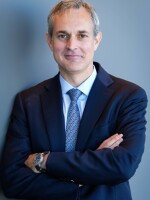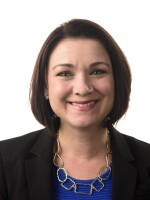Updated at 12 p.m. ET
The impeachment inquiry into President Trump turned its spotlight on Monday on four top White House officials, asking them to testify behind closed doors as Democrats probe whether Trump held up military aid as leverage to get Ukraine to investigate his political rivals.
But none of them showed up, citing legal advice.
The House inquiry had lined up a long list of high-ranking Trump administration officials who they want to talk to before moving into the next phase of the probe, which will involve public hearings and the release of transcripts from closed-door depositions.
That process began on Monday with the inquiry releasing hundreds of pages of transcripts from Marie Yovanovitch, the former U.S. ambassador to Ukraine, who testified on Oct. 11, and Michael McKinley, a former adviser to Secretary of State Mike Pompeo, who testified Oct. 16.
John Eisenberg, the top lawyer at the National Security Council, was directed by Trump and the Justice Department's Office of Legal Counsel to stay away from his scheduled closed-door deposition, Eisenberg's lawyer said.
"Under these circumstances, Mr. Eisenberg has no other option that is consistent with his legal and ethical obligations except to follow the direction of his client and employer, the President of the United States. Accordingly, Mr. Eisenberg will not be appearing for a deposition at this time," William Burck of Quinn Emanuel said in a letter to the impeachment inquiry.
Eisenberg is believed to have made the call to lock down records of the July 25 phone call between Trump and Ukrainian President Volodymyr Zelenskiy in an electronic system meant for sensitive classified information.
Eisenberg's deputy, Michael Ellis — who also received a subpoena — will not appear, Ellis' lawyer Paul Butler of Akin Gump told NPR.
Butler said he informed inquiry staff that Ellis had been advised by the Justice Department's Office of Legal Counsel "that the failure to include or allow agency counsel to an interview doesn't sufficiently protect the relevant privileges here, especially for a lawyer," referring to both executive privilege and attorney-client privilege. The Office of Legal Counsel deemed the subpoena "invalid," and Butler said Ellis had "been instructed not to appear."
"Michael is respectful of the legislative branch and will cooperate with a valid subpoena," Butler said.
Last month, head White House counsel Pat Cipollone said that White House officials would not cooperate with the inquiry, arguing that it "violates fundamental fairness and constitutionally mandated due process" and privilege and immunity for the executive branch of government.
Two other White House officials invited to testify on Monday are declining to cooperate.
Rob Blair, who serves as an adviser to acting White House chief of staff Mick Mulvaney on national security issues, will not appear, a source familiar with the situation told NPR.
Brian McCormack, an energy official at the White House Office of Management and Budget, also will not testify, a spokeswoman for the OMB confirmed to NPR on Sunday.
Focus on Eisenberg
Eisenberg was named by several witnesses in closed-door testimony to the inquiry. Two NSC officials said they took their concerns about a July 10 White House meeting with Ukrainian officials to Eisenberg. And two officials who listened to the July 25 phone call between Trump and Zelenskiy said they talked to Eisenberg about their worries.
According to multiple reports, it was Eisenberg who put records of that call into a highly secure system meant for sensitive classified information.
"If he put the president's conversation with the Ukrainian leader on a restricted platform, which I think he did, then he had every good reason to do it," Michael Mukasey, a former attorney general in the Bush administration who worked with Eisenberg, said in an interview with NPR. "Conversations between heads of state generally are the kinds of conversations that neither participant wants to see released to the public."
Eisenberg, a graduate of Stanford University and Yale Law School, served in the Bush administration as associate deputy attorney general, working on national security issues. He then worked for law firm Kirkland and Ellis before joining Trump's White House shortly after the president's inauguration.
People who have worked with Eisenberg describe him as a competent and careful lawyer who keeps detailed notes. One former colleague in the Trump administration told NPR that Eisenberg would force staffers to leave conversations if they showed up to a meeting without proper clearance. A second former colleague described Eisenberg as a "pretty scrupulous" person who likely would have made a record of why he made the decisions he took.
Eisenberg has three titles, which is rare, Mukasey said. "Don't know anybody who's ever been all three," Mukasey said. "And yet obviously people have confidence in his judgment across the board so that he holds all three positions."
Eisenberg's lawyer did not rule out an eventual appearance. Burck referenced a lawsuit filed by former deputy national security Charles Kupperman, who is seeking a court ruling on whether he needed to comply with the Congressional request to appear or the White House instruction to stay away.
"Mr. Eisenberg, as a lawyer and officer of the court, will abide by whatever final decision the federal judiciary reaches on the dispute between the Executive and Congress," Burck said.
I saw some Fake News over the weekend to correct. As the WH letter made clear two weeks ago, OMB officials - myself and Mike Duffey - will not be complying with deposition requests this week. #shamprocess
— Russ Vought (@RussVought45) October 21, 2019
Other officials who have been called this week are not expected to appear. Michael Duffey, an OMB national security specialist, and acting OMB Director Russell Vought, will decline to cooperate, an OMB spokeswoman said.
Energy Secretary Rick Perry's press secretary confirmed on Friday that he would not appear for a closed-door deposition.
Lawmakers have also asked to hear from Wells Griffith, an NSC energy specialist, and two State Department officials, David Hale and T. Ulrich Brechbuhl.
NPR's Roberta Rampton, Lexie Schapitl, Deirdre Walsh and Claudia Grisales contributed to this story.
Copyright 2020 NPR. To see more, visit https://www.npr.org.





